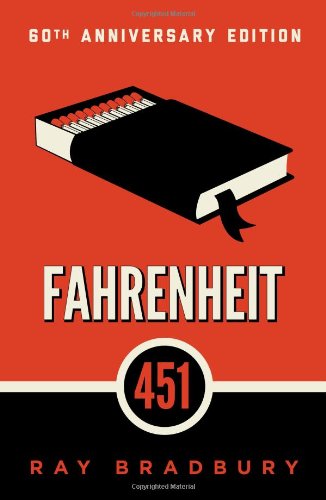All Nonfiction
- Bullying
- Books
- Academic
- Author Interviews
- Celebrity interviews
- College Articles
- College Essays
- Educator of the Year
- Heroes
- Interviews
- Memoir
- Personal Experience
- Sports
- Travel & Culture
All Opinions
- Bullying
- Current Events / Politics
- Discrimination
- Drugs / Alcohol / Smoking
- Entertainment / Celebrities
- Environment
- Love / Relationships
- Movies / Music / TV
- Pop Culture / Trends
- School / College
- Social Issues / Civics
- Spirituality / Religion
- Sports / Hobbies
All Hot Topics
- Bullying
- Community Service
- Environment
- Health
- Letters to the Editor
- Pride & Prejudice
- What Matters
- Back
Summer Guide
- Program Links
- Program Reviews
- Back
College Guide
- College Links
- College Reviews
- College Essays
- College Articles
- Back
Fahrenheit 451 by Ray Bradbury
I recently read Fahrenheit 451 by Ray Bradbury, a dark science fiction novel set in dystopian America. The main premise of the story is that the totalitarian government in America has made books illegal and re-purposed firemen to burn books whenever they are spotted. The story follows fireman Guy Montag who is perfectly content with his job until a strange girl next door leads him to question his life. Montag begins to learn that there is more to life than the simple easy “everything sunny all the time always” attitude that everyone else is supposed to believe.
The book begins suddenly with a vivid description of Montag setting a house ablaze, books and all. Bradbury uses words that communicate the main character’s feelings of greatness, empowerment, and purpose. This attitude towards burning houses with the intent to destroy books intrigues the reader. Instantly making you wonder why exactly books are illegal. You can see Bradbury’s way with words in the sentence
“With the brass nozzle in his fists, with this great python spitting its venomous kerosene upon the world, the blood pounded in his head, and his hands were the hands of some amazing conductor playing all the symphonies of blazing and burning to bring down the tatters and charcoal ruins of history.” (Bradbury, 33 - the first true page of Fahrenheit 451)
In this way, Bradbury manages to pack a lot of information into his sentences without bluntly saying what he means to convey. His writing style shows you Montag’s emotions and very much makes you feel the same way. Meaning he doesn’t need to say things like “Montag was sad”, “This is the future”, or “Books are illegal” for you to understand them. This lets you see Montag’s changing attitudes towards fire, first thinking of it as great and cleansing, until he learns that books are important and that people put time into them and all firemen do is destroy them with evil and nasty fire. At the end of the book, Montag sees a warm red glow from a campfire in the night just after he had escaped from police after being reported for book possession, and realizes that this glow comes from a warm fire that nourishes and helps. That’s when he meets a group of people who memorize books to be written down when times are better. Together, they witness the bombing of the city by an enemy that we the readers, and presumably nobody in the book, are never really told about and see it as a way to rise from the ashes and start civilization anew, as one of the book memorizers says to Montag:
“...we’ve got one thing the Phoenix never had. We know the damn silly thing we just did... [and] some day we'll stop making the goddam funeral pyres and jumping in the middle of them” (Bradbury, 189)
On top of all of this, Bradbury conveys various morals and themes and makes an enjoyable book while he’s at it. He has messages about literature makes us think and question, which the book’s government believes (or wants it people to believe) makes us unhappy. About how technology can never truly and fully replace human interaction. About how modern communications technology makes minority’s voice stronger and a threat to totalitarianism, the list goes on. You’d be surprised with what you can learn from a bleak police state in the future.
While it is a short book and some parts can be a little hard to follow and a little dull, Fahrenheit 451 is a great read with a blend of drama, action, philosophy, and intrigue.
Similar Articles
JOIN THE DISCUSSION
This article has 0 comments.

